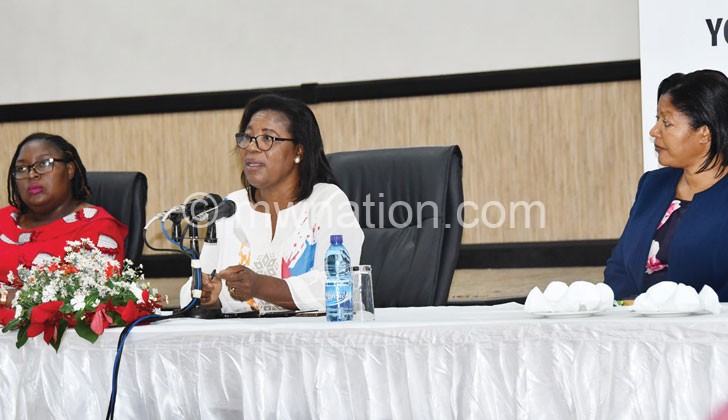MEC confirms 3
The die is cast. Malawi Electoral Commission (MEC) yesterday closed submission of nomination papers by aspirants in the July 2 fresh presidential election and has provisionally confirmed three candidates.
During the two-day exercise from Wednesday to yesterday, MEC chairperson Jane Ansah received nomination papers from Malawi Congress Party (MCP) president Lazarus Chakwera leading a nine-party Tonse Alliance, Mbakuwaku Movement for Develeopment president Peter Kuwani and Democratic Progressive Party (DPP) candidate Peter Mutharika.
She said independent candidate Ras Chikomeni David Chirwa and Smart Swira did not deposit the K2 million nomination fee while Revelend Hardwick Kaliya, Khwechani Nkhoma and Pemphero Mvula voluntarily withdrew.
Ansah, who is a judge of the Malawi Supreme Court of Appeal, said president of New Vision for Democracy Shaibu Mustafa did not pick up his phone on numerous attempts; hence, was excluded from the final list.

In total, there were 13 nomination forms collected with nine filled, according to MEC chief elections officer Sam Alfandika.
Following the exercise, the race will see Chakwera pairing the country’s estranged Vice-President and UTM Party president Saulos Chilima, Kuwani with Archibald Kawalang’oma and Mutharika featuring Cabinet minister and UDF president Atupele Muluzi.
Ironically, Chilima and Muluzi were contestants in the annulled May 21 2019 presidential election. Chilima, making his debut on the presidential ballot, finished third after Mutharika and Chakwera with 1 018 369 votes or 20.24 percent of votes cast while Muluzi was fourth with 235 164 votes or 4.67 percent.
Chakwera, Kuwani and Mutharika were also contestants in the nullified election. MEC’s disputed results gave Mutharika 1 940 709 votes (38.57 percent), Chakwera 1 781 740 votes (35.41 percent) and Kuwani, in fifth place, with 20 369 votes, representing 0.40 percent.
Reacting to the line-up which is a reduction from last year’s seven candidates, political analysts have predicted stiff competition due to respective strengths the political parties in electoral alliances possess individually.
In a telephone interview, Ernest Thindwa, who teaches political science at Chancellor College—a constituent college of the University of Malawi, said the results of the fresh election will be determined by which alliance gets more votes from the rival camp’s stronghold areas.
While describing the choice of Muluzi, son to former president Bakili Muluzi, as running mate to Mutharika as a logical move to garner votes in the Eastern Region districts of Machinga, Mangochi and Balaka, Thindwa said he lacks personal charisma to entice voters.
He said: “I can say that the party [DPP] is looking for the Muluzi and UDF brand that they want to exploit because Atupele doesn’t have the charisma associated with his father to get votes.”
Thindwa said the fact that former president and Peter Mutharika’s elder brother, Bingu wa Mutharika, ditched UDF barely a year in office in 2005 to form DPP outweighed the fact that the party itself needed Atupele and UDF more.
In a separate interview, political analyst Mustapha Hussein said the strength of the DPP and UDF alliance lies in the two parties’ parliamentary working relationship which gives them an edge to easily work effectively together.
He said: “However, MCP too, is making inroads in the Southern Region through some of its leaders like Sidik Mia. Their partner, UTM Party, also has a great command among youths and has the strength in mobilising them while MCP is a stable party with proper structures.”
Hussein said the ball is now in the respective alliances’ court to work out how they will mobilise themselves in their “muted” campaigns to entice voters.
Commenting on what would happen in a scenario where the DPP-UDF alliance tumbles in the fresh election, governance commentator Rafiq Hajat said sustainability of both parties will be at stake.
On his part, politician-cum-commentator Humphrey Mvula said in the scenario where the DPP-UDF alliance fails to make it, the relationship between the two parties may not last because Atupele has demonstrated flexibility to serve any government, having done so with DPP and People’s Party administrations.
Chilima and Atupele lead their respective parties as presidents in their own right.
But Chancellor College dean of law Sunduzwayo Madise said there are no legal repurcussions because people vote for a candidate and not necessarily for a political party.
He said: “The political parties mean nothing. For example, Bingu dumped UDF and formed DPP, a party that he contested on its ticket.”





